Key takeaways:
- Identifying a profitable niche involves thorough market research and reflecting on personal interests to uncover genuine consumer needs.
- Creating a solid business plan is essential for setting clear goals, timelines, and financial projections, providing a roadmap for success.
- Scaling a business requires leveraging technology, networking for opportunities, and diversifying offerings to enhance resilience and growth potential.
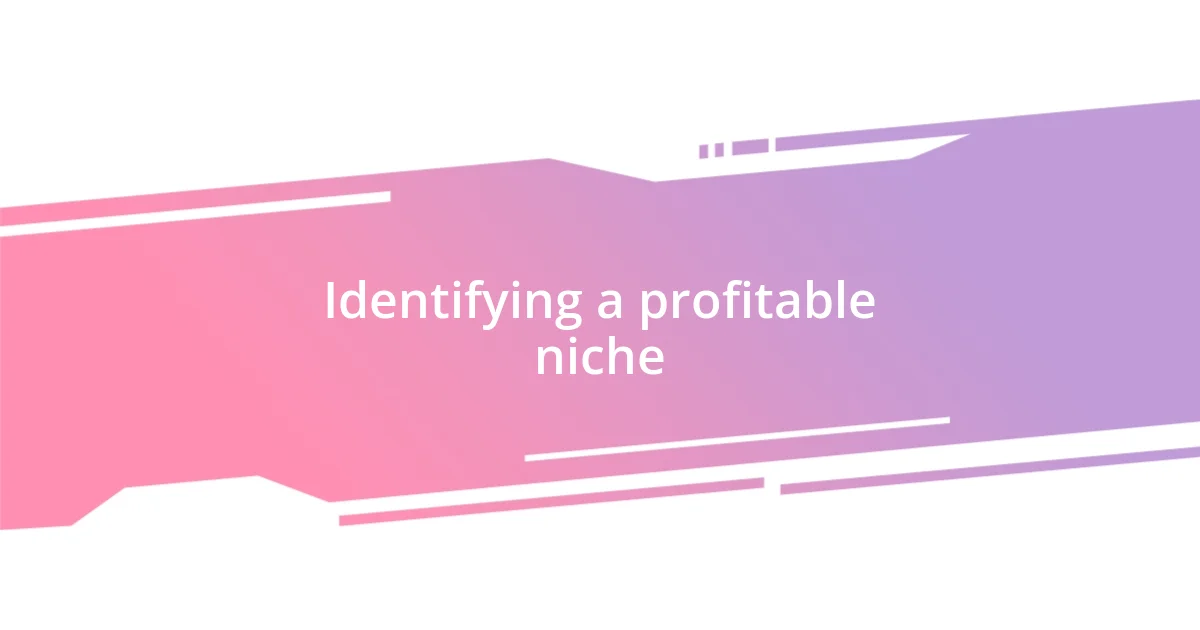
Identifying a profitable niche
Finding a profitable niche can feel like searching for a needle in a haystack, but it can be incredibly rewarding once you find it. When I started my mini-business, I asked myself what problems I could solve or what passions I could turn into profit. For instance, I discovered that many people in my community struggled to find eco-friendly products, so I focused my efforts there.
Conducting thorough market research was crucial for me. I immersed myself in online forums and social media groups to see what people were craving but couldn’t find. It’s amazing how a simple question like, “What is your biggest frustration with current options?” can unveil a wealth of insights and opportunities. I remember being surprised to find an active conversation about sustainable alternatives, which made me realize there was a genuine demand for what I could offer.
Also, don’t underestimate the power of your own experiences and interests. Reflecting on what you’re passionate about can give you clues about potential niches. I found that my love for cooking led me to identify a gap in easy meal prep solutions for busy individuals. It made me wonder, have you ever considered how your hobbies or challenges could translate into a business opportunity? Think about it; your unique perspective could be the key to unlocking a niche that not only benefits others but fulfills you as well.

Conducting market research effectively
The real power of effective market research lies in understanding your audience deeply. When I engaged with potential customers on social media, I felt like I was having a genuine conversation. Their feedback was not just data; it was a window into their lives and needs. I vividly remember one person sharing how difficult it was to find reliable meal kits that catered to dietary restrictions. That specific insight helped me refine my offerings and truly connect with my target market.
To conduct market research effectively, you might consider these steps:
- Identify your target audience and their needs.
- Utilize online platforms like surveys or polls to gather data.
- Analyze competitors to understand what they’re doing right and where they fall short.
- Engage with your audience through social media to spark conversations.
- Attend local events or workshops for in-person feedback.
Each of these steps can lead you closer to an understanding of what will resonate with your audience, paving the way for a successful business venture.
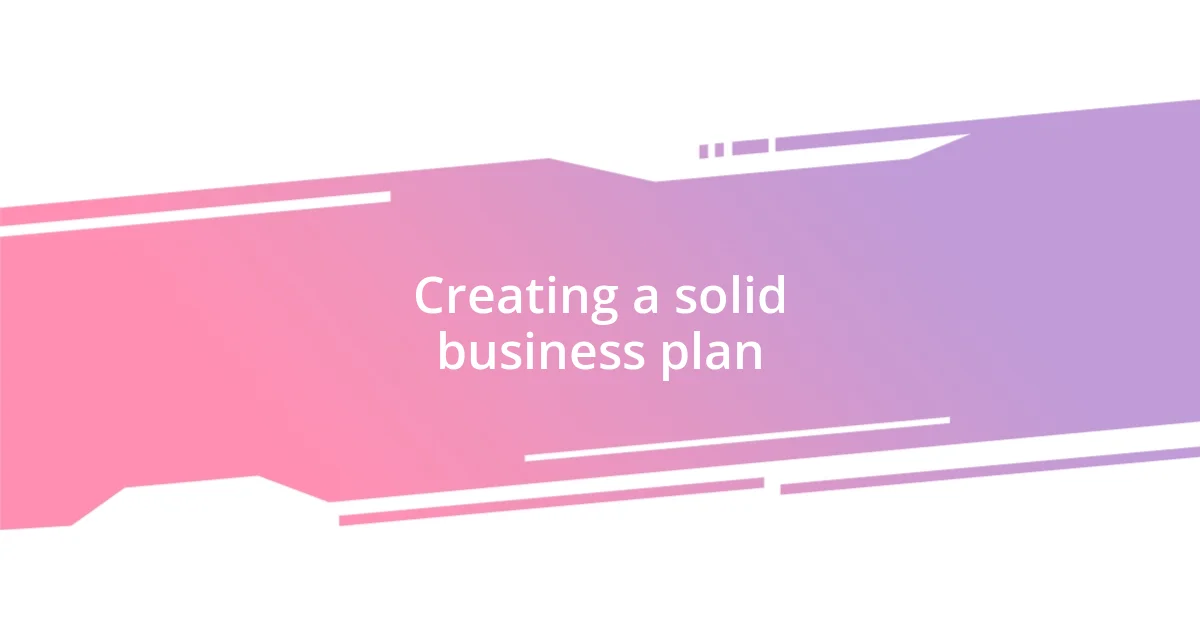
Creating a solid business plan
Creating a solid business plan is akin to laying a sturdy foundation for a house. I remember when I first drafted my plan; I felt a mix of excitement and apprehension. It required me to distill my ideas into clear, actionable steps. I broke down my vision into manageable components, such as budgeting, marketing strategies, and operational processes. Seeing my thoughts organized on paper gave me a sense of direction and purpose, and I recommend doing this to help visualize your goals.
One vital aspect of my business plan was setting realistic goals and timelines. For example, I set a three-month target to launch my product line, which kept me accountable. Defining specific milestones helped me track my progress and make necessary adjustments along the way. I remember one week when unexpected delays almost derailed me; having a timeline in hand helped me pivot quickly and focus on other critical areas, proving the importance of flexibility in your plan.
Lastly, including a financial projection was a game-changer for me. It’s more than just numbers; it’s about forecasting your potential and preparing for challenges. I recall feeling a bit intimidated as I crunched the numbers, but doing so revealed gaps I hadn’t considered before. It taught me the importance of being prepared for fluctuations in sales. Think about this: how can your financial understanding shape your business decisions? Foresight in this area can pave the way for sustainable growth.
| Component | Description |
|---|---|
| Executive Summary | A concise summary of your business idea, goals, and why it matters. |
| Market Analysis | In-depth research about your target audience and competitors. |
| Marketing Strategy | Plans on how to reach your customers effectively. |
| Financial Projections | Estimated revenue, expenses, and profitability over a set timeline. |
| Operational Plan | Day-to-day operations and logistics involved in running your business. |
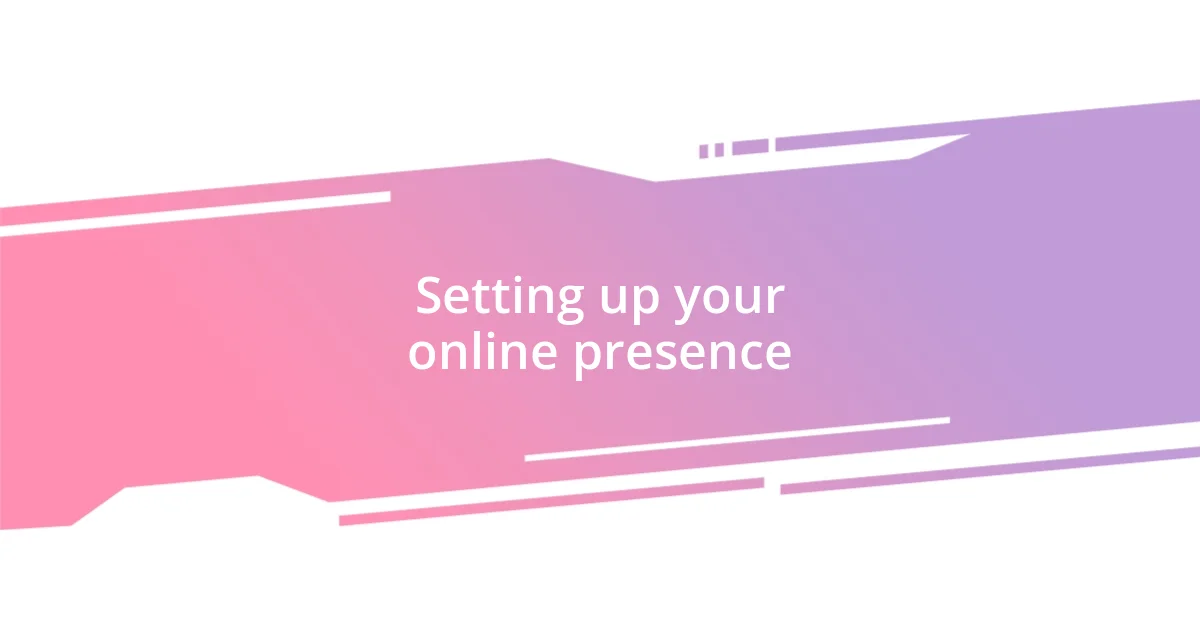
Setting up your online presence
Setting up your online presence felt like stepping into a whole new world for me. I remember the first time I created my website; it was thrilling yet overwhelming. I spent hours picking the right colors, fonts, and images to reflect my brand’s personality. Every detail mattered, and I knew it was my first opportunity to make a lasting impression.
When I launched my social media profiles, I approached it thoughtfully. I didn’t just want to be present; I aimed to create a community. Engaging with followers became a priority, and I often shared behind-the-scenes looks into my business journey. It wasn’t just about promoting products; it was about building relationships. Do you ever wonder how a simple interaction can turn a stranger into a loyal customer? I’ve seen it happen, and it’s incredibly rewarding.
Finally, the importance of SEO (Search Engine Optimization) couldn’t be overstated in my journey. I spent time researching keywords that would help my business show up on search engines. Being visible online is essential, and I recall the moment my site began to attract traffic. Each notification of a new visitor felt like a small victory, reinforcing my belief that I was on the right path. Have you ever celebrated the small wins in your business? They often propel you forward in ways you may not realize.

Promoting your mini business
Promoting my mini business required a multi-faceted approach that felt both exhilarating and daunting. I quickly learned that word-of-mouth can be a powerful tool; the first time a friend recommended my product to someone else, my heart raced with pride. How can a simple recommendation from a friend lead to a sale? It reminded me that genuine connections often yield the best marketing.
Email marketing also played a pivotal role in my promotion strategy. I started collecting emails during my initial launch, and I can still recall the thrill of crafting my first newsletter. It felt like sharing a piece of my journey directly with my audience. I often posed questions about their needs and feedback, creating a dialogue that made them feel included. Have you ever thought about how a simple email can build a bridge between you and your customers? For me, those emails transformed strangers into a supportive community.
Social media advertising was another game-changer. I invested time creating targeted ads, and the moment I saw new customers coming in from those efforts, I felt a rush of validation. I learned to analyze the engagement metrics to see what resonated with my audience. What I found intriguing was that sometimes the ads I least expected to perform well ended up becoming bestsellers. Reflecting on this, I realized that experimentation is just as important as strategy in reaching and growing your audience.
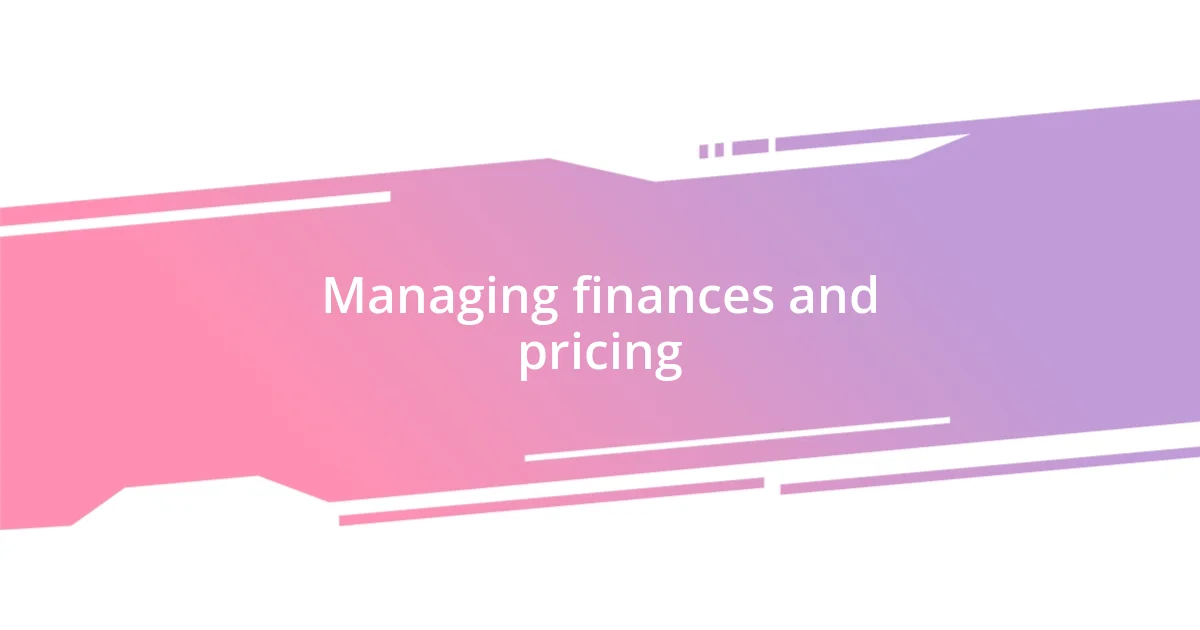
Managing finances and pricing
Managing finances and pricing has been one of the most eye-opening experiences of my mini-business journey. At first, I felt like a deer in headlights trying to set competitive yet fair prices for my products. I remember sitting with a spreadsheet, doing the math, and realizing how crucial it was to factor in not just costs, but also the value I was delivering. Have you ever been torn between wanting to be affordable and needing to make a profit? I learned that striking that balance is both an art and a science.
I found that tracking every expense was not just necessary; it became empowering. By maintaining a detailed budget, I could see where my money was going and which areas needed improvement. The first time I noticed my savings growing, I felt a sense of relief and pride wash over me. It’s astonishing how knowing your financial health can ignite a new level of motivation, isn’t it? I even started treating my finances like a game: the more I saved and smartly spent, the faster I could reinvest back into my business.
Setting prices also meant having tough conversations. I vividly recall when a customer questioned my pricing, and my initial instinct was to justify my costs nervously. But then I realized that I shouldn’t undervalue my work. Instead, I took a deep breath and confidently explained the quality and care that went into creating my product. Have you ever turned a challenging discussion into an opportunity? That moment taught me the importance of standing firm in my pricing, as it’s a reflection of the passion I put into my business.
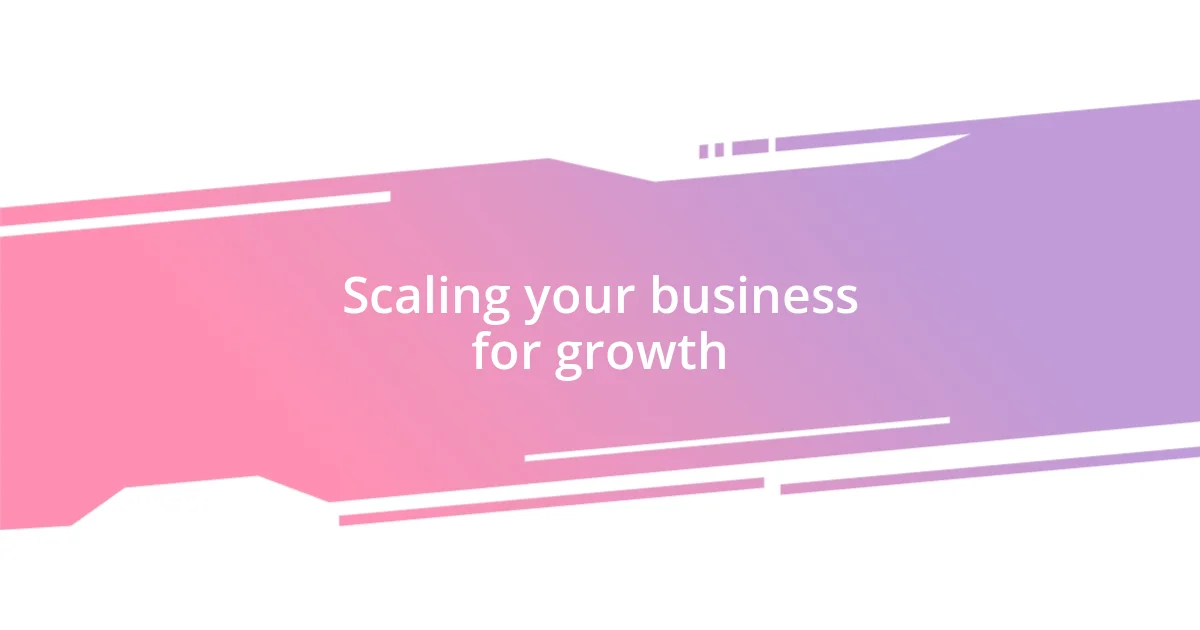
Scaling your business for growth
Scaling my business for growth truly felt like stepping onto a new stage in my entrepreneurial journey. I distinctly remember the day that I decided to branch out into new product lines. The excitement of brainstorming ideas mixed with the fear of risking what I had already built. I found that diversifying my offerings not only attracted new customers but also made my brand more resilient against market fluctuations. Have you ever tried to branch into something new? It can be both exhilarating and nerve-wracking.
As I focused on scaling, I realized that leveraging technology was essential. Hiring a virtual assistant significantly eased my workload and allowed me to shift my attention to strategy rather than just daily operations. The first time I delegated tasks, I felt a wave of relief wash over me. It became clear that scaling wasn’t just about increasing sales; it was also about building a solid foundation to support growth. Picture this: what could you achieve if you had extra hours in your day to focus on innovation?
Networking became another crucial element of my growth strategy. Attending local business meetups opened doors I never knew existed. I remember one particularly engaging conversation with a fellow entrepreneur who shared tips that had transformed her business. That exchange sparked new ideas for collaboration, which eventually led to a joint marketing effort that significantly boosted both our sales. Isn’t it amazing how one conversation can change the trajectory of your business? By embracing connections, I learned that scaling often involves not just the numbers, but also the relationships behind them.














